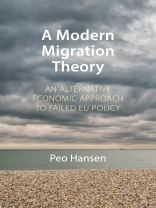2023 EUSA Book Award – Honorable Mention
Current migration policy is based on a seemingly neutral accounting exercise, in which migrants contribute less in tax than they receive in welfare assistance. A “fact” that justifies increasingly restrictive asylum policies. Peo Hansen shows that this consensual cost-perspective on migration is built on a flawed economic conception of the orthodox “sound finance” doctrine prevalent in migration research and policy. By examining migration through the macroeconomic lens offered by modern monetary theory, Hansen is able to demonstrate sound finance’s detrimental impact on migration policy and research, including its role in stoking the toxic debate on migration in the European Union. More importantly, Hansen’s undertaking offers the tools with which both migration research and migration policy could be modernized and put on a realistic footing.
Table of Content
1. Migration: ‘mother of all problems’
2. The fiscal impact of migration
3. A modern migration theory
4. Demography, security and the shifting conjunctures of the EU’s external labour migration policy
5. Labour migration in a sound finance policy logic
6. Why EU asylum policy cannot afford to pay demographic dividends
7. ‘We need these people’: refugee spending, fiscal impact and refugees’ real bearing on Sweden’s society and economy
8. Conclusion
About the author
Peo Hansen is Professor of Political Science at the Institute for Research on Migration, Ethnicity and Society (REMESO), Linkoping University, Sweden. He has written extensively on questions of migration, citizenship and identity and how they relate to the political economy of European integration. His books include The Politics of European Citzenship (with Sandy Brian Hager) and Eurafrica: The Untold History of European Integration and Colonialism (with Stefan Jonsson).












